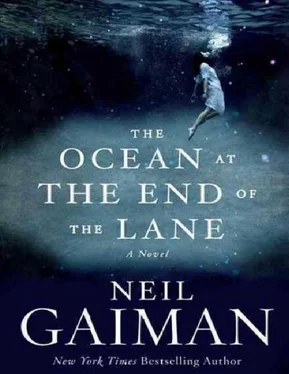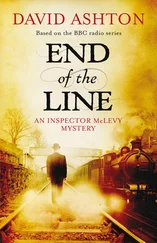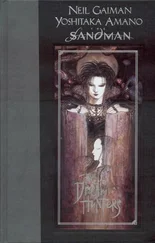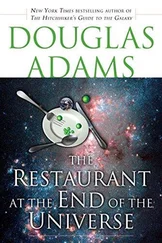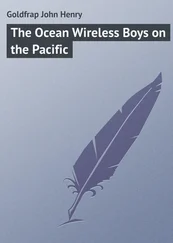Sometimes when I look in the mirror I see my father’s face, not my own, and I remember the way he would smile at himself, in mirrors, before he went out. “Looking good,” he’d say to his reflection, approvingly. “Looking good.”
“Are you here to see Lettie?” Mrs. Hempstock asked.
“Is she here?” The idea surprised me. She had gone somewhere, hadn’t she? America?
The old woman shook her head. “I was just about to put the kettle on. Do you fancy a spot of tea?”
I hesitated. Then I said that, if she didn’t mind, I’d like it if she could point me toward the duck pond first.
“Duck pond?”
I knew Lettie had had a funny name for it. I remembered that. “She called it the sea. Something like that.”
The old woman put the cloth down on the dresser. “Can’t drink the water from the sea, can you? Too salty. Like drinking life’s blood. Do you remember the way? You can get to it around the side of the house. Just follow the path.”
If you’d asked me an hour before, I would have said no, I did not remember the way. I do not even think I would have remembered Lettie Hempstock’s name. But standing in that hallway, it was all coming back to me. Memories were waiting at the edges of things, beckoning to me. Had you told me that I was seven again, I might have half-believed you, for a moment.
“Thank you.”
I walked into the farmyard. I went past the chicken coop, past the old barn and along the edge of the field, remembering where I was, and what was coming next, and exulting in the knowledge. Hazels lined the side of the meadow. I picked a handful of the green nuts, put them in my pocket.
The pond is next, I thought. I just have to go around this shed, and I’ll see it.
I saw it and felt oddly proud of myself, as if that one act of memory had blown away some of the cobwebs of the day.
The pond was smaller than I remembered. There was a little wooden shed on the far side, and, by the path, an ancient, heavy, wood-and-metal bench. The peeling wooden slats had been painted green a few years ago. I sat on the bench, and stared at the reflection of the sky in the water, at the scum of duckweed at the edges, and the half-dozen lily pads. Every now and again, I tossed a hazelnut into the middle of the pond, the pond that Lettie Hempstock had called . . .
It wasn’t the sea, was it?
She would be older than I am now, Lettie Hempstock. She was only a handful of years older than I was back then, for all her funny talk. She was eleven. I was . . . what was I? It was after the bac birthday party. I knew that. So I would have been seven.
I wondered if we had ever fallen in the water. Had I pushed her into the duck pond, that strange girl who lived in the farm at the very bottom of the lane? I remembered her being in the water. Perhaps she had pushed me in too.
Where did she go? America? No, Australia. That was it. Somewhere a long way away.
And it wasn’t the sea. It was the ocean.
Lettie Hempstock’s ocean.
I remembered that, and, remembering that, I remembered everything.
Nobody came to my seventh birthday party.
There was a table laid with jellies and trifles, with a party hat beside each place, and a birthday cake with seven candles on it in the center of the table. The cake had a book drawn on it, in icing. My mother, who had organized the party, told me that the lady at the bakery said that they had never put a book on a birthday cake before, and that mostly for boys it was footballs or spaceships. I was their first book.
When it became obvious that nobody was coming, my mother lit the seven candles on the cake, and I blew them out. I ate a slice ofthe cake, as did my little sister and one of her friends (both of them attending the party as observers, not participants) before they fled, giggling, to the garden.
Party games had been prepared by my mother but, because nobody was there, not even my sister, none of the party games were played, and I unwrapped the newspaper around the pass-the-parcel gift myself, revealing a blue plastic Batman figure. I was sad that nobody had come to my party, but happy that I had a Batman figure, and there was a birthday present waiting to be read, a boxed set of the Narnia books, which I took upstairs. I lay on the bed and lost myself in the stories.
I liked that. Books were safer than other people anyway.
My parents had also given me a Best of Gilbert and Sullivan LP, to add to the two that I already had. I had loved Gilbert and Sullivan since I was three, when my father’s youngest sister, my aunt, took me to see Iolanthe, a play filled with lords and fairies. I found the existence and nature of the fairies easier to understand than that of the lords. My aunt had died soon after, of pneumonia, in the hospital.
That evening my father arrived home from work and he brought a cardboard box with him. In the cardboard box was a soft-haired black kitten of uncertain gender, whom I immediately named Fluffy, and which I loved utterly and wholeheartedly.
Fluffy slept on my bed at night. I talked to it, sometimes, when my little sister was not around, half-expecting it to answer in a human tongue. It never did. I did not mind. The kitten was affectionate and interested and a good companion for someone whose seventh birthday party had consisted of a
table with iced biscuits and a blancmange and cake and fifteen empty folding chairs.
I do not remember ever asking any of the other children in my class at school why they had not come to my party. I did not need to ask them. They were not my friends, after all. They were just the people I went to school with.
I made friends slowly, when I made them.
I had books, and now I had my kitten. We would be like Dick Whittington and his cat, I knew, or, if Fluffy proved particularly intelligent, we would be the miller’s son and Puss-in-Boots. The kitten slept on my pillow, and it even waited for me to come home from school, sitting on the driveway in front of my house, by the fence, until, a month later, it was run over by the taxi that brought the opal miner to stay at my house.
I was not there when it happened.
I got home from school that day, and my kitten was not waiting to meet me. In the kitchen was a tall, rangy man with tanned skin and a checked shirt. He was drinking coffee at the kitchen table, I could smell it. In those days all coffee was instant coffee, a bitter dark brown powder that came out of a jar.
“I’m afraid I had a little accident arriving here,” he told me, cheerfully. “But not to worry.” His accent was clipped, unfamiliar: it was the first South African accent I had heard.
He, too, had a cardboard box on the table in front of him.
“The black kitten, was he yours?” he asked.
“It’s called Fluffy,” I said.
“Yeah. Like I said. Accident coming here. Not to worry. Disposed of the corpse. Don’t have to trouble yourself. Dealt with the matter. Open the box.”
“What?”
He pointed to the box. “Open it,” he said.
The opal miner was a tall man. He wore jeans and checked shirts every time I saw him, except the last. He had a thick chain of pale gold around his neck. That was gone the last time I saw him, too.
I did not want to open his box. I wanted to go off on my own. I wanted to cry for my kitten, but I could not do that if anyone else was there and watching me. I wanted to mourn. I wanted to bury my friend at the bottom of the garden, past the green-grass fairy ring, into the rhododendron bush cave, back past the heap of grass cuttings, where nobody ever went but me.
The box moved.
“Bought it for you,” said the man. “Always pay my debts.”
Читать дальше
